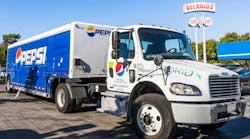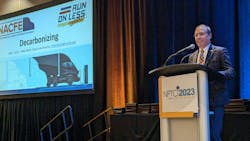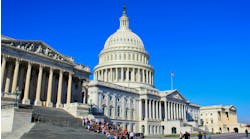ORLANDO, Florida—Some private fleets have more incentives—and corporate pushes—to decarbonize their transportation systems than other trucking operations. With emission-cutting challenges ahead, the National Private Truck Council took steps this week to join an alliance focused on freight advocacy and affiliated with one of North America's leading freight efficiency groups.
Gary Petty, NPTC’s chief executive, told FleetOwner that his membership wants to be part of practical net-zero solutions and learn more about overcoming the challenges—and outside pressures—along that path. The private fleet group is teaming up with the North American Council for Freight Efficiency on the education and research side and the Clean Freight Coalition on the advocacy side.
More private fleets have regional, return-to-base trucking operations with repeatable, fixed routes more applicable for electrification than long-haul trucking. Private fleets also operate for more corporations with zero-emission goals matching the Paris Climate Agreement’s timelines. But political and corporate mandates won’t make the transformation any easier.
See also: Renewable diesel could cut emissions for much less than electrification
“The pressure is everywhere,” Petty told FleetOwner during NPTC 2024. He said there are more corporate and customer pressures for net- and near-zero transportation. Last year, the NPTC board overwhelmingly wanted to focus on helping its members find reasonable and attainable zero-emission solutions.
“We wanted to see what we, as a practical matter, can do to influence the change, and we’re focusing on two ways,” Petty said. One way is through education; the other is through advocacy.
Clean Freight Coalition gains private fleets’ voice in emissions advocacy
“How can we impact regulators' and ideologues' awareness of the realities, including how emissions requirements over the past 30 years have significantly improved the quality of the advanced diesel engine and reduced pollution—which, of course, they don’t care about?” he noted.
NPTC’s Board of Directors authorized the clean energy initiatives this week during its annual conference here in Florida. The council joins other trucking organizations in the Clean Freight Coalition, an alliance that advocates for a reasonable path to trucking decarbonization. The move becomes official on May 1, with annual renewal options.
See also: NPTC renews focus on private fleets’ future
The CFC’s founding members include the American Trucking Associations, the Truckload Carriers Association, and the National Motor Freight Traffic Association. Rick Schweitzer, NPTC's general counsel, will serve as NPTC’s CFC liaison.
Formed in 2023, the CFC focuses on establishing realistic timelines for trucking decarbonization with a shared voice. Jim Mullen, a past acting head of the Federal Motor Carrier Safety Administration, leads the coalition. It recently published an extensive study on what it would take to electrify the entire U.S. trucking industry, which it priced at $1 trillion.
NACFE affiliation will open up private fleets to more efficiency education
The private truck council also entered a three-year affiliation agreement with the North American Council for Freight Efficiency, making the nonprofit an official resource for NPTC member fleets.
Mike Roeth, NACFE’s executive director, and his team have participated in NPTC educational sessions since the freight efficiency group’s inception 15 years ago. Petty praised NACFE’s knowledge and agnostic approach to decarbonization. The nonprofit has released several studies, ranging from how fleets can achieve better MPG to how some early-adopting fleets implement EVs into their operations.
“We will help their fleets when they want to investigate looking into battery-electric, hydrogen, or other sources,” Roeth told FleetOwner during NPTC 2024.
See also: Where natural gas fits in decarbonizing trucking
The two groups decided to formalize the affiliation and create more formal fleet resources. “We’ve got the information and the studies, so there is no need for NPTC to hire its own team to study the technologies and sustainability,” Roeth said. “Instead, they can work with us because we already have a solid encyclopedia of information on this.”
NACFE plans to help interested private fleets navigate paths to net-zero energy transitions. The group will provide educational documents and guidelines for NPTC's popular Certified Transportation Professional program, which has nearly 1,000 active members across the industry.
NACFE also agreed to present training sessions for NPTC events and webcasts. It will also be able to recruit member private fleets for its Run on Less program, which studies actual fleet operations to create reports on various efficiency operations and potential.
“We believe these timely and positive steps will help the future of alternative energy for our membership,” said new NPTC Chairman David Barth, transportation operations manager at Wegmans Food Markets. “The board encourages members to take full advantage of these new resources.”
Petty said that the moves to team up with NACFE and CFC represent the scale of what NPTC does. “It gives our members a really good opportunity to impact the outcomes,” he said. “Private fleets are really keen on doing something new and innovative.”





